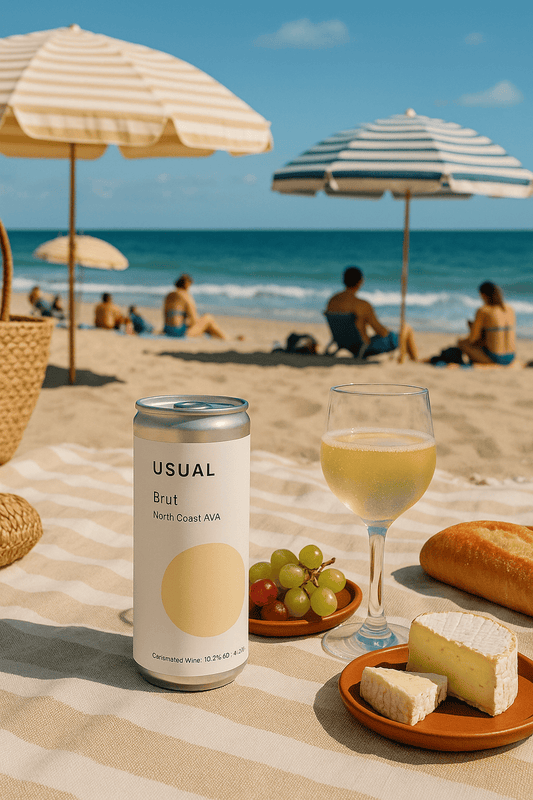In terms of wine, tannins are in grape skins, pips, and stems. While there are tannins in wine of all varieties, red wine is often more tannic than white or rosé since grape skins are left on during the winemaking process.
You can usually tell if a wine will be tannic even before tasting it. If the wine is red, chances are it’ll be higher in tannins. However, some white wines such as chardonnay can be higher in tannins.
Tannins are essential in winemaking, providing the wine with structure and a sense of balance. When a wine is well-made, the tannins and other components such as acidity, alcohol, and sweetness should be in harmony, with none overpowering the other. This equilibrium makes the wine enjoyable and enhances its pairing capabilities with different foods.
__callout__
Upon first sip, note how the wine feels on your tongue, paying particular attention to the middle section. If your tongue and teeth feel dry, chances are your wine is a higher tannin variety.
Why Do Winemakers Love Tannins in Wine?
It's important to note that not all tannins are the same. Tannins can be classified into two broad categories: hydrolysable and condensed tannins. Hydrolysable tannins are derived from the wood used in aging barrels and are often responsible for the vanilla and spice flavors in aged wines. On the other hand, condensed tannins, also known as proanthocyanidins, come from grape skins, seeds, and stems, and are the ones primarily associated with the astringency in wines.
Some winemakers purposely add tannin powder into their wines to raise the tannin level. Why? Because tannins act as a natural antioxidant, which protects the wine from bacteria.
As a result, these powders help the wine to age successfully, taking on complexity in the process. Yet, not all winemakers subscribe to this method. Usual Wines, for instance, believes in the philosophy of 'less is more'. We avoid the use of additives, including tannin powders, and focus instead on quality small-batch winemaking with minimal intervention. This practice allows the natural flavors and inherent characteristics of the grape to shine through.
When a high-tannin wine is aged it often takes on a much smoother texture, which is far less bitter than a younger wine of the same grape. The wine becomes complex and elegant.
Which Wines Have High Tannins?
If you love dark chocolate, black tea, and sour pomegranate, chances are you could also be a fan of wines with high tannins. In this case, look out for the following varieties:
Cabernet Sauvignon: This wine is synonymous with tannins. The illegitimate love child of Cabernet Franc and Sauvignon Blanc, this beloved grape is grown internationally. It’s robust, heavy, highly acidic, and pairs fabulously with red meat and rich cheeses.
Shiraz or Syrah: No matter how you spell it, this is another high-tannin wine. Syrah is full-bodied, deeply dark, and feels quite heavy in the mouth. It has poignant flavors of berries, tobacco, and even smoky savory notes.
__email__
Nebbiolo: This is a lesser-known grape hailing from Italy. Although as pale as its low-tannin distant cousin Pinot Noir (don’t worry, more on that one later), Nebbiolo is intensely tannic. It’s a bold and surprisingly affordable Italian grape, which is always a plus.
Tannins and Health: A Look at the Benefits
As well as providing exceptional texture and intensity, tannins are also celebrated for their health benefits. Studies have shown that wines higher in tannins are healthier for the heart, and countries consuming more of these wines are enjoying longer lives.
In addition to heart health, research has suggested that tannins can have anti-inflammatory and anti-carcinogenic properties, as well as contributing to a lower risk of type 2 diabetes. As always, these benefits apply when wine is consumed in moderation, ideally as part of a balanced diet.
London-based scientist Roger Corder has long said he believes that traditional winemaking production methods, which are commonly used in Sardinia and Southern France, may have a strong connection to the overall well-being and longevity of residents in those regions. That’s because traditional winemaking methods support these beneficial compounds, known as procyanidins (aka condensed tannins).
In an interview some years back, Corder proclaimed, “Wine drinkers who hope to be rewarded with the maximum protection from heart disease should start seeking out wines with firmer tannins.”
Do Tannins Cause Hangovers?
While there isn’t a science-backed connection between tannins and hangovers, many people feel they suffer from harsher hangovers after indulging in high-tannin wines the night before. But there is little to no evidence that this is true.
Still, there’s some research suggesting that some people have tannin sensitivity. Tannin sensitivity can cause headaches, migraines, and stomach pains.
Some attribute tannin sensitivity and tannin headaches to poor winemaking techniques and suggest good-quality wines with high tannins shouldn’t leave you feeling worse for wear.
If you do suspect tannins may be having an adverse effect on you, try sourcing a variety with a lower amount of tannins.
Wines With Low Tannins
If you prefer your wine a little smoother and not so biting, then you may want to opt for one that’s low in tannins. Obvious choices would include unoaked white wines, such as:
Sauvignon Blanc: This highly aromatic wine is marked by its fresh and zingy taste. It often has notes of passionfruit and fresh-cut grass, and pairs nicely with fish and pasta dishes.
Riesling: This highly aromatic wine is marked by its fresh and zingy taste. It often has notes of passionfruit and fresh-cut grass, and pairs nicely with fish and pasta dishes.
While these white wines are a go-to for many, if you’re a red wine lover through and through, here are several low-tannin red wines to get you going:
Pinot Noir: This classic red is internationally adored for its complex flavors and light texture. It has thin grape skins, making it naturally lower in tannins.
Grenache: This full-bodied wine is high in alcohol and has an array of red fruit and cherry flavors. It’s a medium-tannin wine, so while it’s not as low as Pinot Noir, it's a good option for those trying to avoid intense tannic flavors.
Tannins in Wine: It’s a Matter of Personal Taste
Whether you love wine with intense character, or you prefer sticking to something lighter, tannins play a large part in your overall enjoyment of wine.
As a general rule, if you want to avoid firm tannins, choose white wines, rosés, and red wines with thin skins, such as Pinot Noir.
While some people may be sensitive to tannins, these naturally occurring compounds are nothing to be afraid of. So, go ahead and grab a glass of wine and discover what tantalizes your palate. As long as you're having fun, you're doing it right. Knowing about tannins in wine can enrich your wine tasting experiences, making each sip more meaningful. So here's to the joy of wine and the adventure of learning. Cheers!











